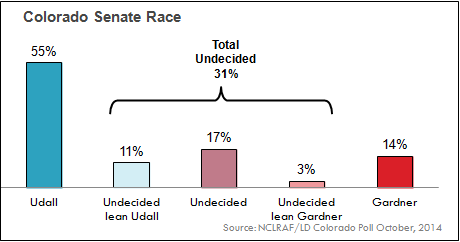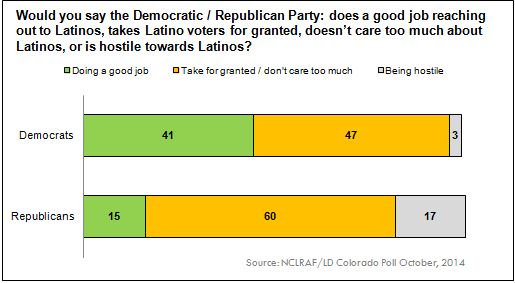Yesterday the The National Council of La Raza Action Fund (NCLRAF) and Latino Decisions released a new poll of Latino voters in Colorado that finds incumbent Democratic Senator Mark Udall holds a substantial lead over his Republican challenger Cory Gardner.
The poll finds Udall leading among Latino voters with 55 percent of the vote, compared to Gardner’s 14 percent; another 31 percent are undecided.

In 2012, the Hispanic electorate represented 14 percent of the statewide electorate and was a decisive factor in President Obama’s victory in Colorado. With almost 90 percent of registered Latino voters indicating they will vote in the very competitive Colorado election next month, it is imperative for both candidates to shore up support from the Latino electorate that will surely be decided by a narrow margin.
“Latinos are poised to once again be a deciding factor in Colorado’s tight race for Senate where both candidates are virtually tied,” said Matthew McClellan, Executive Director of the NCLR Action Fund. “The window of opportunity to engage this electorate is rapidly closing as we draw closer to Election Day. If either candidate wants to boost their numbers with Latinos, then they will need to get serious about the issues that matter most to this community.”
Economic concerns are priority issues for Latino voters this election cycle. Creating more jobs and fixing the economy were tied, with 24 percent of Latino voters in Colorado indicating these issues would be most important in drawing them to the polls on Election Day. Immigration remains similarly important with 23 percent of respondents citing immigration reform as their top priority. In fact, more than half of Latino voters (55%) said that House GOP attempts to cancel the Deferred Action (DACA) program make them less likely to vote for Republican Congressional candidates. With respect to other issue positions, candidates who support raising the minimum wage fair better with Latino voters, with nearly 70 percent saying they would vote for candidates who increase wages for workers. And, nearly 80 percent of respondents said that they would be more likely to vote for a candidate who supports expanding Medicaid.
Both parties have work to do in building relationships with the Latino electorate. The majority of Latino voters in Colorado do not think either party is doing a good job of reaching out to Latino voters.

Democrats are viewed more favorably, 41 percent say the party is doing a good job on Latino outreach. However, Democrats should be concerned that 47 percent of Latino voters in Colorado think the Democratic Party takes Latino voters for granted or does not care too much about them at all. Republicans fare much worse, with a mere 15 percent of Latino voters indicating the GOP does a good job on Latino outreach. It comes as no surprise that 60 percent think the Republican party takes Latino voters for granted or does not care about them. Another seventeen percent view the GOP as being hostile towards Latinos altogether. In sum, both parties need to establish better relationships with this electorate to incorporate Latinos into their reliable base of voters (in the short and long term).
“It’s clear that there is more work to be done for both parties,” added McClellan. “But in order to make sure that they take our community seriously, we need to disprove this myth that Latinos don’t vote during the midterms and come out in full force to support candidates who support the Latino community.”


